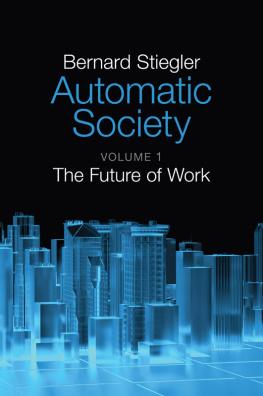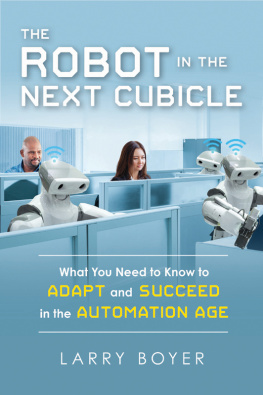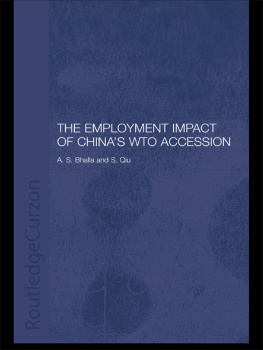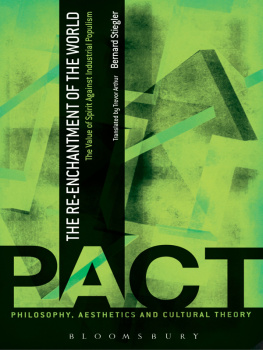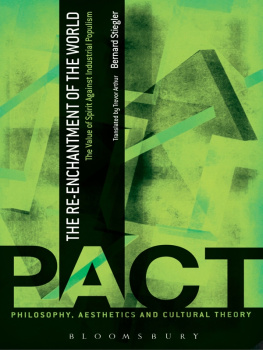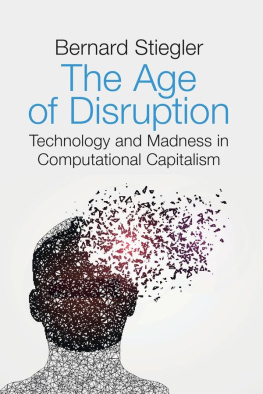
Copyright page
First published in French as La Socit automatique. 1. LAvenir du travail, Librairie Arthme Fayard, 2015
This English edition Polity Press, 2016
Polity Press
65 Bridge Street
Cambridge CB2 1UR, UK
Polity Press
350 Main Street
Malden, MA 02148, USA
All rights reserved. Except for the quotation of short passages for the purpose of criticism and review, no part of this publication may be reproduced, stored in a retrieval system, or transmitted, in any form or by any means, electronic, mechanical, photocopying, recording or otherwise, without the prior permission of the publisher.
ISBN-13: 978-1-5095-0630-9
ISBN-13: 978-1-5095-0631-6 (pb)
A catalogue record for this book is available from the British Library.
Names: Stiegler, Bernard, author.
Title: Automatic society / Bernard Stiegler.
Other titles: Socit automatique. English
Description: Cambridge, UK ; Malden, MA : Polity Press, [2016] | First published in [French] as La Socit automatique. | Includes bibliographical references and index. Contents: Volume 1. The future of work
Identifiers: LCCN 2016023994 (print) | LCCN 2016046717 (ebook) | ISBN 9781509506309 (v. 1 : hardcover : alk. paper) | ISBN 1509506306 (v. 1 : hardcover : alk. paper) | ISBN 9781509506316 (v. 1 : pbk. : alk. paper) | ISBN 1509506314 (v. 1 : pbk. : alk. paper) | ISBN 9781509506330 (mobi) | ISBN 9781509506347 (epub)
Subjects: LCSH: AutomationEconomic aspects. | AutomationSocial aspects. | Technological innovationsSocial aspects. | Technology and civilizationPhilosophy.
Classification: LCC HD6331 .S73513 2016 (print) | LCC HD6331 (ebook) | DDC 338/.064dc23
LC record available at https://lccn.loc.gov/2016023994
Typeset in 10.5 on 12 pt Sabon by Toppan Best-set Premedia Limited
Printed and bound in Great Britain by CPI Group (UK) Ltd, Croydon, UK
The publisher has used its best endeavours to ensure that the URLs for external websites referred to in this book are correct and active at the time of going to press. However, the publisher has no responsibility for the websites and can make no guarantee that a site will remain live or that the content is or will remain appropriate.
Every effort has been made to trace all copyright holders, but if any have been inadvertently overlooked the publisher will be pleased to include any necessary credits in any subsequent reprint or edition.
For further information on Polity, visit our website: politybooks.com
Rational objectivity, technical objectivity and social objectivity are now tightly connected. To neglect one of these aspects of modern scientific culture is to enter the sphere of utopia.
Gaston Bachelard
We untiringly construct the world in order that the hidden dissolution, the universal corruption that governs what is should be forgotten in favor of a clear and defined coherence of notions and objects, relations and forms the work of tranquil man. A work that nothingness would be unable to infiltrate and where beautiful names all names are beautiful suffice to make us happy.
Maurice Blanchot
These motors must be very different from all the others. It seems logical to suppose that Morel designed them so that no one who came to this island would be able to understand them. But the difficulty in running the green motors must stem from their basic difference from the other motors. As I do not understand any of them, this greater difficulty disappears. [] And what if Morel had thought to photograph the motors
Adolfo Bioy Casares
Notes
Gaston Bachelard,
L'Activit rationaliste de la physique contemporaine (Paris: PUF, 1951), p. 10. Maurice Blanchot,
The Infinite Conversation (Minneapolis and London: University of Minnesota Press, 1993), p. 33. Adolfo Bioy Casares,
The Invention of Morel (New York: New York Review of Books, 2003), p. 91.
Introduction
Functional Stupidity, Entropy and Negentropy in the Anthropocene
The strangest thing about this remarkable return of humankind into history is that the Anthropocene provides the clearest demonstration that, from an environmental point of view, humanity as a whole does not exist.
Christophe Bonneuil and Jean-Baptiste Fressoz
1. What occurred between 23 June and 23 October 2008
In an analysis of Google's business model in Wired on 23 June 2008, Chris Anderson showed that the services provided by this company which are based on what Frdric Kaplan has called linguistic capitalism
Continuing with a form of reasoning similar to that which he applies to the epidemiology of Google, Anderson comes to the conclusion that what is referred to today as big data, consisting of gigabytes of data that can be analysed in real time via high-performance computing, no longer has any need for either theory or theorists as if data scientists, specialists in the application of mathematics to very large databases through the use of algorithms, could replace those theoreticians that scientists always are in principle, regardless of the scientific field or discipline with which they happen to be concerned.
Four months later, on 23 October 2008, Alan Greenspan appeared before a Congressional hearing to explain the reasons behind so many financial catastrophes that were unleashed after the subprime crisis of August 2007. Challenged for having failed to anticipate or prevent the systemic crisis, he defended himself by arguing that the scale of the crisis was due to the misuse of financial mathematics and automated calculation systems to assess risk, mechanisms established by digital trading in its various forms (from subprime to high-frequency trading): It was the failure to properly price such risky assets that precipitated the crisis. In recent decades, a vast risk management and pricing system has evolved, combining the best insights of mathematicians and finance experts supported by major advances in computer and communications technology. his intention being to assert that, if there is blame to be apportioned, it ought not to fall only upon the president of the US Federal Reserve: the whole apparatus of computerized formalization and automated decision-making undertaken by financial robots was involved, as well as the occult economic theory that gave it legitimacy.
If until August 2007 this had managed to function (this paradigm having held sway for decades), if computerized formalization and automated decision-making had been imposed in fact, this whole intellectual edifice, however, collapsed [that summer] because the data inputted into the risk management models generally covered only the past two decades, a period of euphoria. I would add to Greenspan's statement that the ideologues of this rational risk management were undoubtedly not unaware of the limitations of their data sets. But they assumed that historic periods of stress had occurred only because these financial instruments did not exist during these periods, or because competition was not yet perfect and undistorted. Such was the concealed theory operating behind these robots, robots that supposedly objectify reality and do so according to market rationality.
Not long after the publication of Chris Anderson's article on Google, Kevin Kelly objected that, behind every automated understanding of a set of facts, there lies a hidden theory, whether there is awareness of it or not, and, in the latter case, it is a theory
Next page
